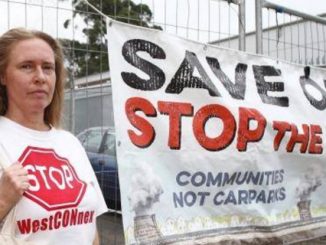Can pop-up shops liven up Leichhardt, the same way they revived Newcastle’s worn out CBD?
Shallowness. Short attention spans. Exploding credit card debts. Excessive focus on instant gratification. These are all characteristics that consumer trend firm Trendwatcher places on the new age of consumer ‘Nowism’, from which the sub-trend of the pop-up store (think upmarket lemonade stand) has sprung.
Like the scratch-and-sniff sticker craze of the ‘70s, the briefly-passing and loudly-announced retail store offers consumers a new combination of instantaneous desire and gratification, with the pop-up element epitomising the exclusive, spontaneous and exhilarating possibilities of consumerism that online retail, as well as chain shopfronts, have failed to fulfil. With Adidas trialling a temporary store shaped like a shoebox and One Direction’s short-lived fan magnet, everyone from Louis Vuitton to eBay have been known to spring a pop-up. And now Leichhardt Council is taking its turn.
Far from the gimmick driven sales of mass-consumerism, however, Leichhardt Council is seeking to borrow the pop-up format to rekindle the street culture of this once buzzing suburb. Storefront vacancies along Norton Street and the Italian Forum have risen to 13 per cent, with landlords struggling to fill vacancies in less than three months. And with the high-density flight path forming an audible mourning hymn to Little Italy’s now-tired night life, us Inner Westies know this suburb has seen better days.
Funnily enough these dour conditions make Leichhardt the prime spot for a pop-up infestation – such is the premise of Leichhardt Council’s partnership with Renew Australia, a not-for-profit organisation that promotes urban renewal by lending vacant properties to unique creative enterprises which otherwise could not afford a commercial lease.
While Renew offers no monetary incentive to the landlords of the properties it borrows, founder Marcus Westbury maintains Renew’s model offers big value to store owners and communities alike.
“When we first started Renew in Newcastle, we noticed one of the main reasons store owners couldn’t get tenants was because there was a whole lot of other empty shops around. We started to convince owners to let us borrow the buildings on a 30-day rolling basis while they were empty and then engaged with people with ideas to fill those spaces. We mainly work with local artisans and jewellers who want to take their craft to the next level but don’t want to take out a long-term lease and mortgage to do it. Sometimes a storefront works and sometimes it doesn’t, but in the interim the empty spaces gets cleaned up, there are people in there, it’s active and it gets people interested. We make it more likely for the owners that the area will attract commercial tenants again,” he said.
Hoping to jumpstart the program before Christmas, applications to fill six properties in the Norton Street and Forum area have already opened, with more properties along these strips, as well as along Parramatta Road, said to be opening soon.
Mayor Darcy Byrne, who instigated the partnership with Westbury after hearing of Renew’s success in Newcastle’s main drag, is hopeful that local pop-ups will provide unique attraction to Leichhardt’s streetscape.
“Converting vacant properties into performance spaces, galleries and entertainment venues will give people a reason to come to Leichhardt again,” he said. “It’s an ideal setting for pop-up creative projects from artists, designers, photographers, filmmakers, musicians, publishers and creative entrepreneurs, which has the potential to attract a whole new crowd.”
Whether the project will actually attract a new crowd or a short-term media buzz is yet to be seen but the pop-up phenomena itself (ironically) seems to be gaining long-term appeal. Local creative Athena Maroulis of the bespoke handbag project Anthinaeum has recently opened up her second pop-up store on the iconic Newtown King Street strip. Athena sees Sydney’s increasing adoption of the pop-up format as much more than a cynical attempt to get products into the news cycle, and rather as a symptom of consumers’ turn towards local industry.
“I think pop-up’s are taking off because in today’s climate people want things that aren’t mass produced, they want things that are unique, locally made and grassroots. They want to meet the people that made what they are buying, people crave that personal connection. And because of that desire there’s a whole community of young people willing to just give stuff a go. Pop-ups allow you to trial your ideas without a huge commitment,” she said.
Travelling between Guatemala and Australia to source the traditional textiles she uses to make her handbags, leasing short-term spaces to ‘pop’ suits Athena’s lifestyle and online retailing business perfectly. “I’m not ready to commit to a full-time lease and you can get a reasonable short-term deal on spaces that have been out of rent. From a pop-up you get quick impact and even having your logo on a shopfront gets you great brand-exposure. Plus I love talking to people in person and the immediacy of receiving feedback in-store.”
As if solely to illustrate Athena’s words, a man walks in to her store mid-way through our conversation and states, “I think my sister would really like this shop.” He takes a business card and leaves. Athena says this is not uncommon.
“People just get really excited. Whether it’s commuters going to work, or mums taking daily walks, people are always excited to see something new, different and colourful in their suburb.”
Although Renew’s Marcus Westbury shares Athena’s belief in pop-ups to foster community retail, he admits he’s ambivalent about the new ‘shorter is better’ ethos that comes with them. “I actually hate the term ‘pop up’ because, of course, we do hope that some of our projects will gain permanency. I have seen some of our store-holders end up buying the buildings they were borrowing, or move on to commercial leases, thanks to their success,” he said.
As for Leichhardt itself, Westbury is positive about the difference a few rough and ready start-ups could make to the area. “The main street is at the psychological heart of a lot of communities. So having it be a vibrant dynamic place filled with local character and characters is a really nice thing and gives a community confidence. For the individuals who will be involved with the Leichhardt project, it’s a chance to share what they do with their whole community.”
Leichhardt may prove yet that pop-ups aren’t the flaky, pretentious, attention-seeking offspring of mass-consumption that we initially suspected, so keep an eye on any ‘popping’ up in your suburb anyway, because your local pop-up just might be round for a lot longer than its name suggests.
Words: Phoebe Moloney.
Photo: Ben Cregan.



Leave a Reply
You must be logged in to post a comment.